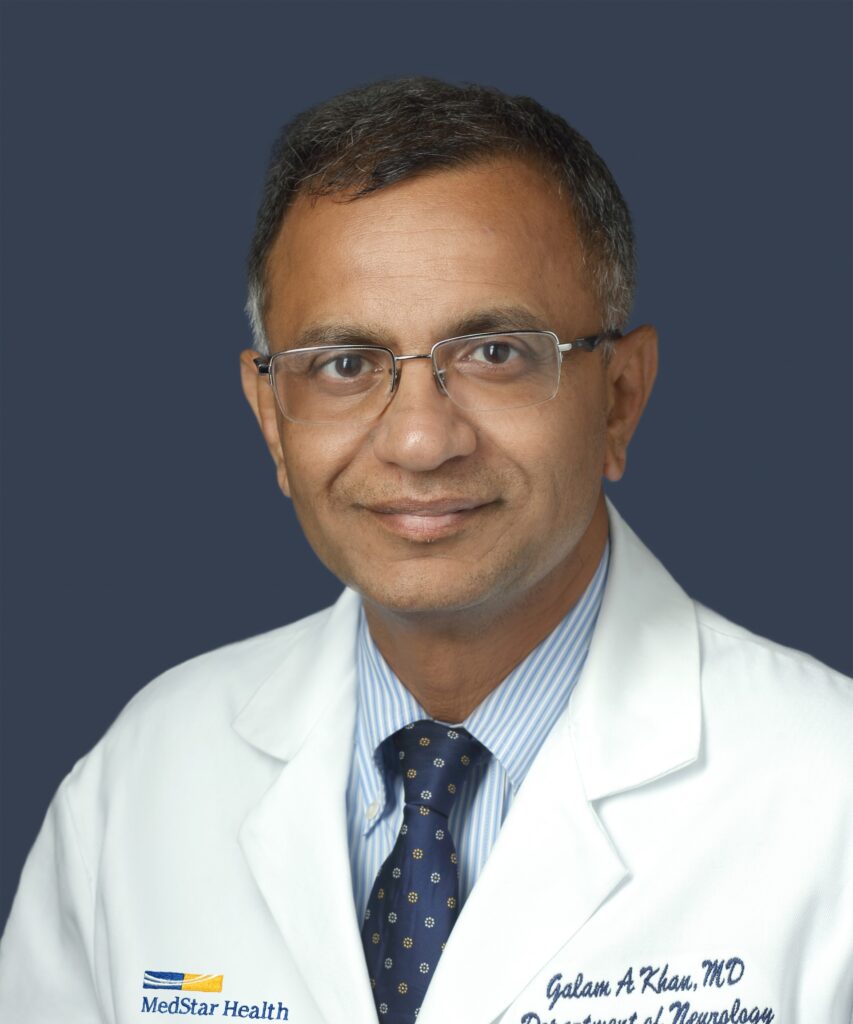Georgetown Brain Bank

If you wish to specify research funding be used for clinical trials or a specific disease, please include that information in Special Instructions on the giving form.
Mission Statement
The Georgetown Brain Bank (GBB), part of Georgetown University Medical Center and MedStar Health, serves as a comprehensive resource for education, clinical diagnosis, and research. We provide thorough neuropathological evaluations for families and clinicians. Additionally, we manage the procurement, storage, and distribution of tissue and biofluids with meticulous care, supplying de-identified materials to support scientific research aimed at understanding neurological diseases and discovering cures.
Introduction
Medical autopsy remains the “gold standard” for diagnosing and classifying neurological diseases. Autopsies also allow (when permitted) collection of tissues and biofluids for research into the pathology of specific diseases. However, reimbursement for autopsies by the federal government, even at academic medical centers, is very limited. As a result, autopsy rates have dramatically decreased in recent years. This is occurring at a time when clinical trials for new neurotherapeutics desperately need to have established diagnoses during studies and confirmed upon autopsy and when the genetics of diseases need to be correlated with pathological and clinical findings.
We established the Georgetown Brain Bank in late 2011 to serve three key constituents of our academic medical center: our patients and clinicians, our trainees/students, and our researchers.
- Families and the clinical teams caring for our patients with neurological diseases benefit from a careful neuropathological examination to provide accurate diagnoses and context to patients’ illness and valuable information for descendants.
- Medical students, neuroscience graduate students, resident and fellow physicians learn about neurological diseases from educational sessions on neuropathology.
- The research community has access to de-identified well-characterized tissues/fluids to allow for translational research projects and collaborative neuropathologists to assist them. Clinical researchers are able to confirm diagnoses crucial to understanding results of their trials.
Progress to Date:
Cases
- We have been very successful in recruiting interested families receiving care from the Memory Disorders Program and MGUH Neurology Department for donation of tissues to the GBB. To date we have tissue donations in the GBB with diagnoses ranging from individuals with no neurologic diseases, to ALS, Alzheimer’s disease, Parkinson’s disease, Brain tumors, Diffuse Lewy Disease, Frontotemporal Dementia, PANS/PANDAS, Multiple Sclerosis, and long-COVID (among others).
Funding
- Several grateful families have made philanthropic donations which have been essential to supporting the initial establishment and ongoing efforts of the GBB.
- We have received foundation grant support from Target ALS to work with other prominent academic medical centers in the United States for ALS tissue banking specifically. Dr. Harris serves as the co-director for this multi-center project. The other universities participating in this postmortem study are Columbia University, The University of Edinburgh, Barrow Neurological Institute, Washington University in St. Louis, and University of California San Diego. This is the largest and most comprehensive ALS tissue banking program in the US. Target ALS also supports Georgetown Brain Bank donors who are cognitively normal (controls) and those with Frontotemporal Dementia.
- Georgetown University Medical Center and MedStar Georgetown University Hospital have provided continuing support for the GBB.
- Georgetown has received philanthropic funding from the Alex Manfull Fund to start a new brain bank for PANS/PANDAS and other Neuroimmune Disorders (POND Brain Bank) – the first of its kind in the world!
- The Alzheimer’s Clinical Trials Consortium (ACTC) supports GBB donors who participated in clinical trials.
Protocols
- We have developed specific protocols for tissue banking, obtained support from the MedStar Georgetown University Hospital’s Neurology Department for an autopsy coordinator, worked with Georgetown University informatics colleagues to develop a Redcap secure on-line database for case information, involved multiple students and trainees in conferences reviewing the pathology of each case, provided detailed neuropathological reports for families/clinicians, presented Clinical Pathological Correlations (CPCs) on cases to clinical teams, and provided tissues after signing material transfer agreements with Georgetown University as well as with external NIH and other University investigators and pharmaceutical companies in the USA and globally for disease treating/curing research.
Ongoing Goals
- To work with GUMC/MGUH Development Offices to explore philanthropic funding sources to support GBB growth.
- To continue refining logistics for CNS-only autopsies at MGUH and other MedStar Hospitals, hire/allocate personnel to support the GBB, and maintain physical equipment/space.
- To work with GUMC investigators to incorporate biofluids as part of the GBB repository.
- To provide de-identified tissue/fluid samples to GU/MGUH/Medstar investigators and external investigators directly collaborating with these investigators.
- To identify further external grant/contract support for CNS biobanking program.
- To collaborate with the GUSOM School of Medicine’s Anatomical Donor Program to share donors.
- To work with the Infinite Legacy program and DC Office of the Chief Medical Examiner to expand our collections.
The decision to undergo a medical autopsy/tissue donations for a brain bank is a very personal one for patients and their families. Discussion among family members and with care providers is important.
Families unaffiliated with MGUH and not covered through a specific research study protocol may be eligible for a consult neuropathology evaluation and tissue donation but will have to pay for brain autopsy services.
Competent individuals may indicate their desire for brain autopsy and donation in their living will so that family members know their wishes and can discuss this with their clinicians. Most often individuals do not die in the hospital and logistics need to be arranged with the families’ chosen funeral home, the next-of-kin, the patient’s physician, and the GBB. Permission for the autopsy and donation can only be given after the individual has passed away.
Tissues for research are most beneficial soon after death, and having the logistics worked out in advance is very helpful. The GBB is available to assist with this. Our Neurology Autopsy Coordinators can be contacted for information and forms to review (Ms. Alexis Gumble, alexis.c.gumble@medstar.net and Ms. Marina Selenica, ms4739@georgetown.edu, or 202-687-4466). Dr. Khan (gak2@georgetown.edu) is also available to answer questions and discuss the process.
While some funding for the GBB is being provided by GUMC and MGUH, the GBB will only be sustainable with significant philanthropic and grant support. We seek to obtain support to maintain current operations as well as to assist families with all transportation fees and allow for after-hours/weekend donations. If you would like to make a tax-deductible donation to the GBB please contact our Development Office at 202-687-4491 or see link on this page for “Make a Gift.”
FAQs
Do I qualify to donate to the Georgetown Brain Bank?
We accept brain donations and have grant funding for individuals with a range of neurological conditions, including:
- Neurodegenerative disorders such as Amyotrophic Lateral Sclerosis (ALS), Frontotemporal Dementia (FTD), or ALS/FTD.
- Healthy control donors (individuals without central nervous system diseases).
- PANS/PANDAS, POTS, Sydenham’s Chorea, Lyme, and other neuroimmune disorders.
- Long Covid Sydrome
Additionally, we accept brain donations from individuals with the following conditions, provided they are also seen by an MGUH physician:
- Alzheimer’s disease, Parkinson’s disease, and Diffuse Lewy Body Disease.
- Brain tumors of various types.
If you are unsure whether you qualify, we encourage you to contact our lead coordinator, Alexis Gumble, or Marina Selenica for further guidance.
Is there a fee associated with brain donations to the Georgetown Brain Bank?
There is no cost associated with brain donation for individuals who:
- Have been diagnosed with ALS, ALS/FTD, or FTD.
- Are healthy control donors (individuals without central nervous system diseases).
- Long Covid Syndrome
Additionally, there is no fee for brain donations from individuals with the following conditions, provided they are also seen by an MGUH physician and we have sustained institutional and philanthropic support:
- Alzheimer’s disease, Parkinson’s disease, and Diffuse Lewy Body Disease.
- Brain tumors of various types.
- Other neurological conditions
Our mission is to facilitate critical research at no financial burden to the donor or their family.
What is the expected turnaround time for receiving my loved one’s neuropathological report?
Following a brain autopsy, the comprehensive neuropathological analysis typically takes 6 to 9 months to complete. This timeframe allows our specialists to conduct a thorough examination. Our coordinators will work with the family to obtain medical records that are necessary to review in all cases.
Once the evaluation is finalized, neuropathologists Dr. Harris and Dr. Khan, will generate a detailed report. This report will be shared with your family or the designated Medical Power of Attorney (POA) and can be reviewed with our team via:
- A phone consultation with our team.
- A Zoom meeting with our neuropathologists for an in-depth discussion of the findings.
If you have any further questions, please do not hesitate to reach out to our team for assistance.
Unfortunately, we cannot accept total donation of the body unless this is coordinated through the GU Anatomical Donor Program or similar programs in the area. If not participating in one of these programs, the family will need to have a funeral home ready to accept the body after tissue donation.
Brain Banking in the 21st Century
Learn more about the Georgetown Brain Bank by viewing this December 2023 webinar designed to educate attendees about its history, operation, mission and goals.
Contact Information

Galam A. Khan, MD
Assistant Director, Georgetown Brain Bank
GUMC, Dept. of Neurology

Alexis Gumble PA-C
Coordinator, Georgetown Brain Bank
GUMC, Dept. of Neurology
1420 Beverly Road, Suite 300, McLean, VA 22101
Office phone: 202-687-4466 (messages left on this line will be addressed as soon as possible, but not be returned until morning of the next working day if left at night or over the weekend).
Fax number: 410-354-4565
Marina Selenica, MS
Program Manager, TALS Postmortem Core & Coordinator, POND Brain Bank
GUMC, Dept. of Neurology
Building D, Room 333
4000 Reservoir Road, NW
Washington, DC 20057
Office phone : 202-687-4466
E-mail: ms4739@georgetown.edu
